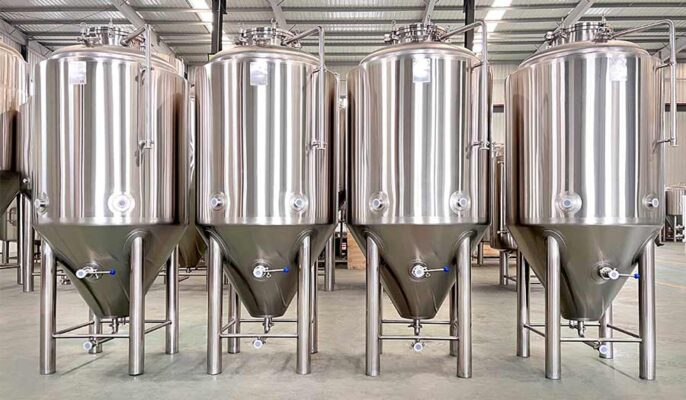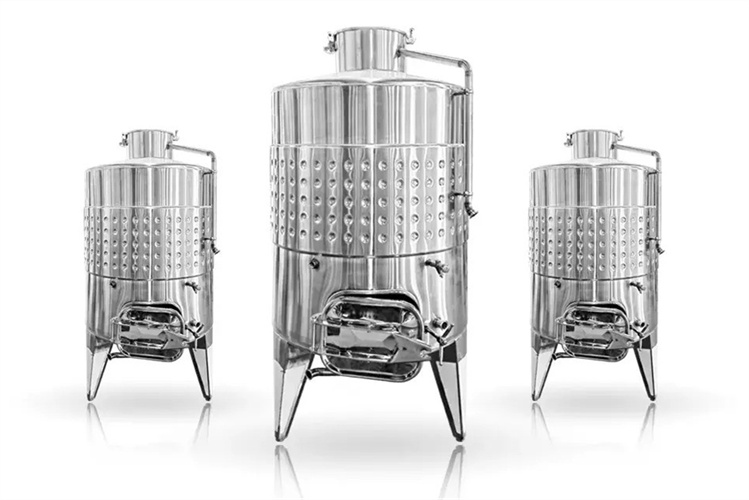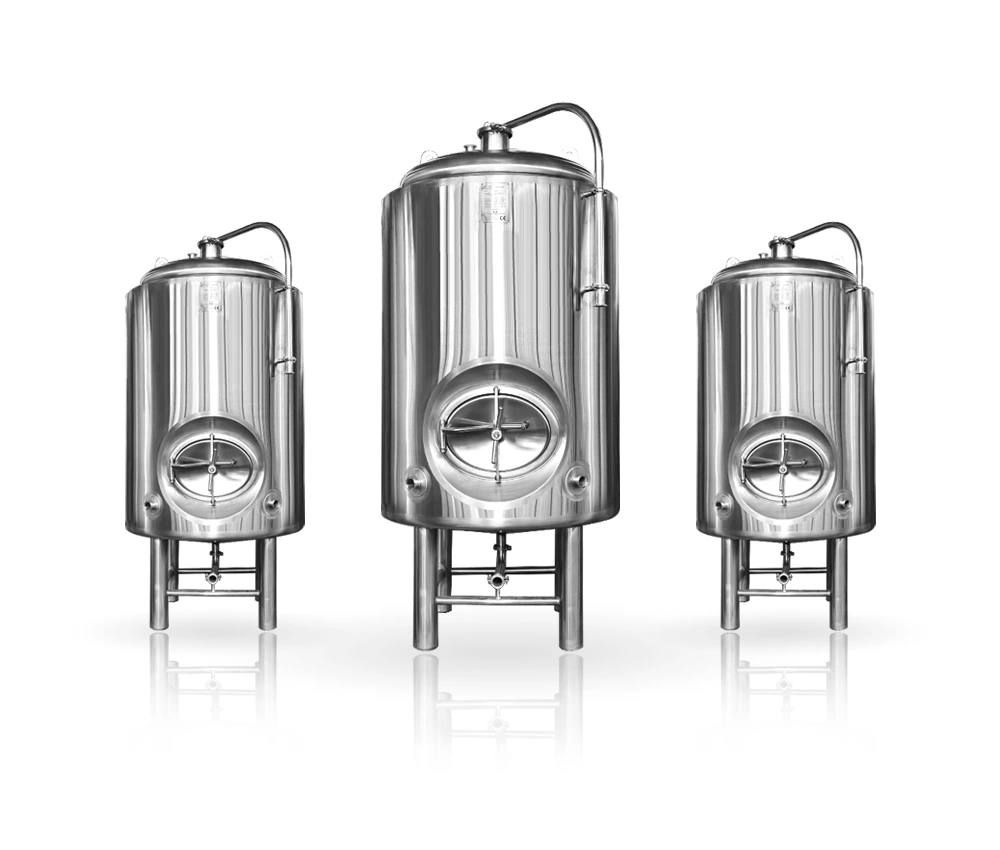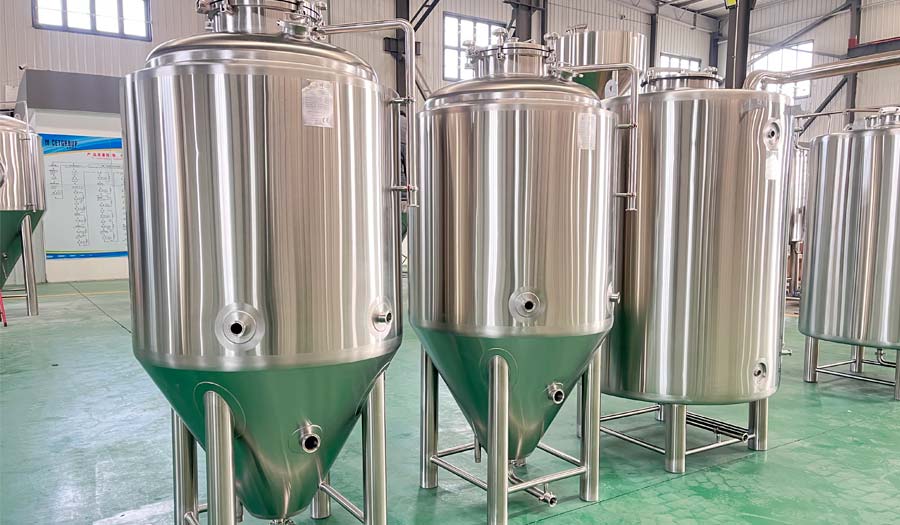Commercial brewing equipment is the backbone of any large-scale brewery operation. It includes essential brewing machinery such as brewhouses, fermentation tanks, and conditioning tanks. Without the right equipment, breweries can struggle to maintain consistent beer quality or scale their production to meet growing demand.
A typical commercial brewing system includes various components like mash tuns, boil kettles, fermentation vessels, and storage tanks. These systems are designed to handle larger batches, increase efficiency, and provide precise control over brewing conditions like temperature, pressure, and fermentation time. A professional brewing setup ensures the process is smooth from start to finish, allowing brewers to focus on perfecting their craft.
2. How Do You Choose the Right Brewing Equipment for Your Brewery?
When selecting commercial brewing equipment, it’s crucial to consider several factors. First, assess the size of your brewery and your production goals. A microbrewery may need a more compact brewing system like a 3.5bbl setup, while larger breweries may opt for 20HL or even 50HL systems.
The material of the brewing equipment is also critical. Stainless steel is the standard material for high-quality brewing systems due to its durability, corrosion resistance, and easy cleaning. You’ll also want to consider customization options to ensure the equipment can handle your specific brewing process, whether you’re focusing on lagers, IPAs, or other beer styles.
Working with a reputable brewing equipment supplier ensures you can access custom-designed systems that meet your specific needs, while also providing technical support for setup, maintenance, and future expansions.

3. What Are the Types of Brewing Equipment Available for Craft Breweries?
For craft breweries, the variety of brewing equipment available is both diverse and highly customizable to match the unique needs of every brewing operation. The right selection of equipment and supplies plays a crucial role in ensuring not only smooth daily operations but also the consistent production of quality beer that aligns with brand standards.
Brewhouses
Brewhouses are undeniably the heart of the brewing process. This is where the critical initial stages of beer brewing occur, including mashing, lautering, boiling, and whirlpooling. In these systems, wort is crafted by precisely combining malt, water, and hops. From compact 1bbl systems ideal for testing recipes, to expansive 50HL setups designed for high-volume output, brewhouses come in all sizes.
Many breweries opt for 3-vessel or 4-vessel brewhouses to allow for greater flexibility, process control, and efficiency. These setups separate core stages like mash, boil, and lautering into distinct vessels, which is especially beneficial when producing a variety of beer styles. High-quality beer brewing equipment helps in achieving good beer consistently across batches.
Fermentation Tanks
After the wort is transferred from the kettle, fermentation tanks become the next vital phase in the brewing journey. These fermentation vessels are often conical in shape, designed to facilitate easy yeast collection and enhance cleaning efficiency. The right fermenter ensures optimal yeast activity, which is critical in converting sugars into alcohol and developing the final flavor profile of the craft beer.
Modern fermentation systems often feature jacketed tanks for superior temperature control, which is crucial in managing yeast behavior during both ale and lager fermentation. Breweries looking for quality brewing equipment typically invest in durable, sanitary-grade stainless steel fermenters, known for their longevity and cleanability. While many breweries use single fermenters, one tank solutions—like unitanks—combine fermentation and conditioning in one vessel, simplifying processes without sacrificing quality.
Kegs, Brite Tanks, and More
Beyond fermentation, packaging and conditioning play a major role in preserving the integrity of the final product. Brite tanks serve as the final stop for beer before it’s packaged or served. These tanks are designed for carbonation, clarification, and storage. Whether used in a commercial brewery or a small taproom, brite tanks help improve beer clarity and stability.
Kegs remain a popular format for distribution and service, particularly in brewpubs and restaurant chains. Efficient keg washers are also essential to maintain sanitation standards and protect beer from contamination. While less visible, components like control systems, sanitary fittings, and specialized equipment and supplies are just as important as the main tanks, ensuring every part of the system functions with precision.
Choosing the right microbrewery equipment means not just selecting tanks and kettles, but designing a complete, optimized brewing process. Whether you’re launching a startup or scaling an existing operation, your success hinges on choosing the right brewing solutions—and quality brewing equipment is the foundation.
If you’re in need of fermentation tanks, explore the Stainless Steel Fermentation Tank & Bright Tanks to find premium solutions for your brewery needs.
4. Why Should You Invest in High-Quality Commercial Brewing Equipment?
Investing in high-quality commercial brewing equipment is not just a wise decision—it’s a necessary step for any brewery aiming to thrive in the competitive craft beer market. The initial cost may be higher, but the long-term benefits far outweigh the expenses. Here’s why.
Consistency in Brewing
High-quality brewing equipment ensures that your beer production remains consistent, day in and day out. Whether you are brewing IPAs, lagers, or sours, a reliable system gives you the ability to maintain the same taste, aroma, and quality in every batch. This consistency is vital for brand reputation and fostering customer loyalty. When customers know they can count on a familiar flavor every time, they are more likely to return and recommend your brewery.
Moreover, professional brewing equipment comes with precise temperature control, allowing for optimal fermentation and mashing. Without accurate control systems, even small fluctuations can affect your beer’s flavor profile, leading to customer dissatisfaction.
Durability and Longevity
Durability is another key advantage of investing in high-quality brewing systems. Stainless steel tanks, for example, are built to withstand years of heavy use, resisting corrosion and wear over time. Unlike cheaper alternatives, stainless steel brewing equipment offers a long service life, which reduces the need for frequent repairs or replacements.
For example, fermentation tanks made of stainless steel can endure the harsh environment inside the fermentation vessel, where pressure and temperature fluctuate. This makes them far superior to plastic or lower-grade alternatives, which may degrade quickly or require constant maintenance. Over time, this reduces downtime and the associated costs of equipment repairs.
Reduced Maintenance Costs
Investing in high-quality equipment means fewer breakdowns and less disruption to your brewing operations. Regular maintenance on lower-quality equipment can be both costly and time-consuming. In contrast, durable commercial brewing equipment requires minimal maintenance and is designed to handle the rigors of continuous brewing.
Keg washers, for instance, are often essential for commercial breweries. High-quality models ensure the efficient cleaning of kegs, reducing labor costs and minimizing the chances of contamination. Proper cleaning also extends the life of your beer brewing equipment, preventing bacterial growth that could ruin batches of beer.
Additionally, investing in sanitary-grade systems (like sanitary fittings and valves) ensures you meet health regulations while optimizing your cleaning processes. This further decreases the risk of contamination and maintains the quality beer you’re known for.

Better Return on Investment (ROI)
While the upfront cost of professional brewing equipment might seem higher, its long-term value can’t be overstated. High-quality systems reduce operational costs over time, increasing brewing efficiency and improving yields. For example, turnkey brewery solutions that are fully automated save labor costs by reducing the need for hands-on intervention at every stage of production.
The reduced need for repairs, lower maintenance costs, and fewer instances of product contamination ensure that your ROI improves significantly. Plus, brewery design that incorporates high-quality equipment from the beginning ensures that scaling up production as demand increases is easier and more cost-effective.
As your brewery grows, your investment in industrial brewing equipment pays off by supporting larger production volumes with consistent quality. This enables you to meet market demand without sacrificing the integrity of your product.
Investing in high-quality brewing equipment isn’t just about purchasing a machine—it’s about setting your brewery up for success. By ensuring consistency, reducing downtime, and offering long-term durability, professional brewing equipment can provide your business with the foundation it needs to thrive. Whether you’re brewing craft beer or expanding into new markets, the decision to invest in quality equipment is one that will pay dividends for years to come.
5. How Does a Turnkey Brewery Solution Streamline Beer Production?
A turnkey brewery solution is a complete brewing system that includes everything needed to start brewing beer, from the brewing equipment to the necessary components like fermentation tanks, pumps, and control systems.
Choosing a turnkey brewery package streamlines the setup process and ensures that all components are compatible. This system eliminates the need to source equipment from multiple suppliers, which can lead to delays and complications. For brewery owners, it also means reduced installation time and better technical support, leading to faster time-to-market for your beer.
If you’re looking for a complete brewing solution, check out the 10BBL 2 Vessel Microbrewery Equipment for a seamless brewery experience.
6. How to Optimize Your Brewing System for Efficiency and Quality?
Efficiency is crucial in commercial brewing, especially when you’re scaling up production or aiming for consistent quality across batches. To optimize your brewing system, focus on these three core areas:
temperature control, grain milling, and fermentation management.
A reliable automated control system helps brewers monitor and fine-tune processes in real time. This ensures that each batch meets the expected standards of quality beer, reducing errors and improving operational speed.
Why Temperature Control Is Critical
Temperature is one of the most important factors throughout the brewing process.
-
During mashing, precise heat control ensures that sugars are fully extracted from malted grains.
-
In fermentation, consistent temperature directly impacts yeast performance and flavor development.
Even a slight fluctuation can result in off-flavors, incomplete fermentation, or batch inconsistencies.
Brewing System Comparison: Choosing Your Heat Source
Here’s a quick look at three popular brewing system heating options:
| System Type | Temperature Control | Energy Efficiency | Installation Cost | Best For |
|---|---|---|---|---|
| Electric Heating | High | High | Medium | Small-to-mid craft breweries |
| Steam Heating | Very High | High | High | Large production breweries |
| Direct Fire | Medium | Low | Low | Mobile or traditional brew setups |
Among them, electric brewing systems are ideal for precise control and modern automation, especially in medium-sized setups.
Equipment That Enhances Efficiency
A modern electric brewing system usually includes:
-
Programmable logic controllers (PLC)
-
Built-in chillers for rapid wort cooling
-
Temperature-regulated vessels
These features allow brewers to handle multiple beer styles efficiently, save time, and reduce energy waste.

Beyond the brewhouse, professional brewers depend on specialized equipment and supplies, such as:
-
Sanitary tanks
-
Fermentation vessels
-
Beer brewing equipment with food-grade stainless steel construction
Working with a trusted brewing equipment manufacturer ensures access to turnkey systems that are durable, automated, and easy to maintain.
Choosing the right fermentation vessel can greatly impact both the final product and your daily workflow.
7. What Are the Latest Innovations in Commercial Brewing Equipment?
The brewing industry has seen several innovations in recent years, with automation and electric brewing systems leading the charge. Automated brewing equipment allows for minimal human intervention, reducing the risk of human error and improving the overall consistency of each batch. These systems also allow for remote monitoring and control, making it easier to manage brewing from anywhere.
Electric brewing systems are also growing in popularity. These systems offer precise control over temperatures and can reduce energy costs by eliminating the need for gas-powered heating elements. For breweries looking to reduce their carbon footprint, electric systems provide a more sustainable brewing option.
Discover the benefits of an Automated Brewing System to upgrade your brewery’s efficiency.
8. How Can Customizable Brewing Equipment Benefit Your Business?
Customizable brewing equipment is a powerful asset for any brewery seeking long-term adaptability, precision brewing, and brand differentiation. Whether you’ve just started a brewery, or you’re expanding into a multi-line operation, the ability to tailor your setup to fit specific production goals is a major advantage.
Flexible Brewing for Evolving Needs
A flexible brewing system can adapt to multiple beer styles and changing batch volumes. For brewers, this means more freedom to:
-
Experiment with new recipes
-
Produce limited editions and seasonal styles
-
Scale up production as demand grows
When you’re able to adjust mash tun capacity, fermentation tanks, or wort transfer design, you unlock new opportunities in beer production without overhauling your infrastructure.
Many successful breweries start small—often on a 1bbl system—but grow fast by upgrading with custom components that match their evolving recipes and volume needs.
Enhanced Control and Sanitary Design
Modern custom brewing systems come equipped with:
-
Automated temperature control
-
Modular sanitary fittings and valves
-
CIP (Clean-in-Place) systems
-
Food-grade stainless steel vessels
These features streamline operations and improve hygiene—especially critical during fast-paced production or when switching styles. Tanks with multi-zone jackets or pressure-control valves also support more accurate fermentation and faster tank turnover.
Unitanks and Fermentation Efficiency
If you want to save time and space, unitanks are a game-changer. A unitank allows you to carry out both primary and secondary fermentation in one vessel—ideal for streamlining production without compromising quality.
Combined with features like:
-
Conical bottoms for yeast collection
-
Insulated jackets for precise cooling
-
Top ports for CO₂ venting or dry hopping
…unitanks are a go-to solution for brewers prioritizing performance and flexibility.
Why It Matters
A customized brewing system supports:
-
Scalability – from pilot batch to full-scale
-
Professional level brewing – even for small teams
-
Efficiency – better tank turnover, faster cleaning
-
Consistency – through automated, precision control
Whether you’re brewing IPAs, lagers, or kombucha, having equipment tailored to your workflow ensures your brewery performs at its best—batch after batch.
Looking for a customizable setup? Explore options like the Stainless Steel Fermentation Tank & Bright Tanks for complete flexibility.
9. What Are the Essential Maintenance Practices for Brewing Equipment?
Regular maintenance is essential to ensure your brewing equipment runs smoothly. Clean-in-place (CIP) systems are vital for maintaining hygiene, especially in fermentation tanks and brewing vessels. By regularly cleaning and sanitizing your equipment, you reduce the risk of contamination and ensure high-quality beer production.
It’s also important to inspect all components of your brewing system, from pumps and valves to the control systems, to ensure everything is functioning as it should. Routine check-ups can prevent costly breakdowns and keep your brewery operating at peak efficiency.
10. What Are the Most Popular Brewing Equipment Packages for Different Breweries?
Different breweries require different brewing systems. For smaller craft breweries, a 1bbl or 3.5bbl system may suffice. However, larger commercial breweries or brewpub chains may need a 10HL or even 50HL setup.
Popular systems include the 300L Small Batch Brewery System, ideal for small operations, and the 1500L 3 Vessel Brewery Equipment, which caters to medium-sized production. For large-scale operations, a 20HL 4 Vessel Commercial Brewery Equipment might be the right choice.
These customizable systems allow breweries to choose the perfect setup based on their production needs, ensuring they can scale effectively without sacrificing quality.
FAQs
-
How do I know if I need a 3-vessel or 4-vessel brewing system?
-
Can I customize my brewing equipment to fit my specific beer styles?
-
What are the benefits of investing in stainless steel brewing tanks?
-
How long does it take to install a turnkey brewery system?
-
What is the difference between a microbrewery and a commercial brewery?
Key Takeaways:
-
Investing in high-quality, customizable brewing equipment is crucial for achieving consistent and efficient beer production.
-
Turnkey brewery systems offer convenience and reliability for new and expanding breweries.
-
Innovations in brewing technology, such as automated control systems and electric brewing, can enhance efficiency and reduce energy consumption.
-
Regular maintenance is essential for ensuring the longevity and performance of brewing equipment.
For more information on brewing systems and equipment solutions, check out our 300L Small Batch Brewery System or 10BBL 2 Vessel Microbrewery Equipment.




